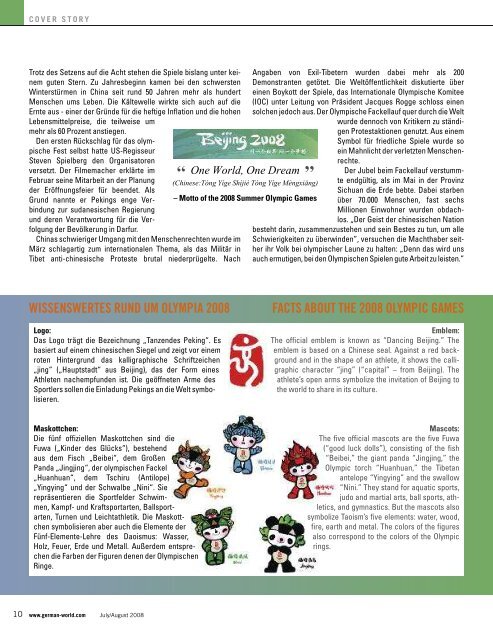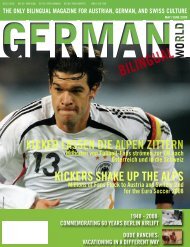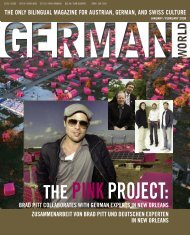GW0708 Cover final copy - German World
GW0708 Cover final copy - German World
GW0708 Cover final copy - German World
Create successful ePaper yourself
Turn your PDF publications into a flip-book with our unique Google optimized e-Paper software.
10<br />
Trotz des Setzens auf die Acht stehen die Spiele bislang unter keinem<br />
guten Stern. Zu Jahresbeginn kamen bei den schwersten<br />
Winterstürmen in China seit rund 50 Jahren mehr als hundert<br />
Menschen ums Leben. Die Kältewelle wirkte sich auch auf die<br />
Ernte aus - einer der Gründe für die heftige Inflation und die hohen<br />
Lebensmittelpreise, die teilweise um<br />
mehr als 60 Prozent anstiegen.<br />
Den ersten Rückschlag für das olympische<br />
Fest selbst hatte US-Regisseur<br />
Steven Spielberg den Organisatoren<br />
versetzt. Der Filmemacher erklärte im<br />
Februar seine Mitarbeit an der Planung<br />
der Eröffnungsfeier für beendet. Als<br />
Grund nannte er Pekings enge Verbindung<br />
zur sudanesischen Regierung<br />
und deren Verantwortung für die Verfolgung<br />
der Bevölkerung in Darfur.<br />
Chinas schwieriger Umgang mit den Menschenrechten wurde im<br />
März schlagartig zum internationalen Thema, als das Militär in<br />
Tibet anti-chinesische Proteste brutal niederprügelte. Nach<br />
WISSENSWERTES RUND UM OLYMPIA 2008 FACTS ABOUT THE 2008 OLYMPIC GAMES<br />
Logo:<br />
Das Logo trägt die Bezeichnung „Tanzendes Peking“. Es<br />
basiert auf einem chinesischen Siegel und zeigt vor einem<br />
roten Hintergrund das kalligraphische Schriftzeichen<br />
„jing“ („Hauptstadt“ aus Beijing), das der Form eines<br />
Athleten nachempfunden ist. Die geöffneten Arme des<br />
Sportlers sollen die Einladung Pekings an die Welt symbolisieren.<br />
Maskottchen:<br />
Die fünf offiziellen Maskottchen sind die<br />
Fuwa („Kinder des Glücks“), bestehend<br />
aus dem Fisch „Beibei“, dem Großen<br />
Panda „Jingjing“, der olympischen Fackel<br />
„Huanhuan“, dem Tschiru (Antilope)<br />
„Yingying“ und der Schwalbe „Nini“. Sie<br />
repräsentieren die Sportfelder Schwimmen,<br />
Kampf- und Kraftsportarten, Ballsportarten,<br />
Turnen und Leichtathletik. Die Maskottchen<br />
symbolisieren aber auch die Elemente der<br />
Fünf-Elemente-Lehre des Daoismus: Wasser,<br />
Holz, Feuer, Erde und Metall. Außerdem entsprechen<br />
die Farben der Figuren denen der Olympischen<br />
Ringe.<br />
www.german-world.com July/August 2008<br />
“ One <strong>World</strong>, One Dream ”<br />
(Chinese:Tóng Yíge Shìjiè Tóng Yíge Mèngxiǎng)<br />
– Motto of the 2008 Summer Olympic Games<br />
Angaben von Exil-Tibetern wurden dabei mehr als 200<br />
Demonstranten getötet. Die Weltöffentlichkeit diskutierte über<br />
einen Boykott der Spiele, das Internationale Olympische Komitee<br />
(IOC) unter Leitung von Präsident Jacques Rogge schloss einen<br />
solchen jedoch aus. Der Olympische Fackellauf quer durch die Welt<br />
wurde dennoch von Kritikern zu ständigen<br />
Protestaktionen genutzt. Aus einem<br />
Symbol für friedliche Spiele wurde so<br />
ein Mahnlicht der verletzten Menschenrechte.<br />
Der Jubel beim Fackellauf verstummte<br />
endgültig, als im Mai in der Provinz<br />
Sichuan die Erde bebte. Dabei starben<br />
über 70.000 Menschen, fast sechs<br />
Millionen Einwohner wurden obdachlos.<br />
„Der Geist der chinesischen Nation<br />
besteht darin, zusammenzustehen und sein Bestes zu tun, um alle<br />
Schwierigkeiten zu überwinden”, versuchen die Machthaber seither<br />
ihr Volk bei olympischer Laune zu halten: „Denn das wird uns<br />
auch ermutigen, bei den Olympischen Spielen gute Arbeit zu leisten.”<br />
Emblem:<br />
The official emblem is known as “Dancing Beijing.” The<br />
emblem is based on a Chinese seal. Against a red background<br />
and in the shape of an athlete, it shows the calligraphic<br />
character “jing” (“capital” – from Beijing). The<br />
athlete’s open arms symbolize the invitation of Beijing to<br />
the world to share in its culture.<br />
Mascots:<br />
The five official mascots are the five Fuwa<br />
(“good luck dolls”), consisting of the fish<br />
“Beibei,” the giant panda “Jingjing,” the<br />
Olympic torch “Huanhuan,” the Tibetan<br />
antelope “Yingying” and the swallow<br />
“Nini.” They stand for aquatic sports,<br />
judo and martial arts, ball sports, athletics,<br />
and gymnastics. But the mascots also<br />
symbolize Taoism’s five elements: water, wood,<br />
fire, earth and metal. The colors of the figures<br />
also correspond to the colors of the Olympic<br />
rings.<br />
2008 Summer Olympic Games:<br />
Is China's Olympic 'Dream'<br />
Slipping Away?<br />
Good-luck symbols are intended to help the Olympic Games,<br />
but nature and Spielberg had other ideas<br />
The Chinese swear by the number eight. They consider it their<br />
lucky number. It also explains the symbolic importance of the<br />
numerical sequence the hosts have come up with for the<br />
opening of the XXIX Olympic Games. The world’s most spectacular<br />
sports event will start on 08.08.08 at 8:08 p.m. in Beijing. Until August<br />
24th (three times eight), 11,000 athletes from more than 200 countries<br />
will compete for medals in 28 sports. The program features 302<br />
events, one event more than four years ago in Athens. Some events<br />
take place outside Beijing: sailing in Qingdao, soccer in Qinhuangdao,<br />
Shanghai, Shenyang and Tianjin, equestrian in Hong Kong.<br />
The “Middle Kingdom” is pumping the gigantic sum of $40 billion<br />
into the games. As the most densely populated nation on earth<br />
(population: 1.3 billion), the emerging giant’s ambition to show the<br />
rest of the world what it is capable of appears to be inexhaustible.<br />
The Communist Party of China has subordinated everything else to<br />
the prestigious project.<br />
Twelve new event locations have been constructed. The centerpiece<br />
of the games is the 91,000-seat National Stadium that was<br />
only recently completed. As the last stadium built, it is also the most<br />
important one. Having earned the name “Bird’s Nest” for its futuristic<br />
construction, the stadium is made of 42,000 tons of steel, is 330<br />
meters long, 220 meters wide and 69 meters tall.<br />
The cityscape of Beijing, home to 20 million people, has radically<br />
changed since China’s capital was awarded the games on July 13,<br />
2001. Investments have been made in new apartment and business<br />
complexes. Old apartment complexes that stood in the way of modernization<br />
were destroyed, and many people were forced to relocate.<br />
A new public transportation system was constructed as well<br />
with five subway lines, a light rail system, buses, and a new airport<br />
that is twice as big. With new sewage treatment plants, garbage<br />
disposal plants and forestation efforts, the organizers want to<br />
honor their pledge to hold “green games.”<br />
Whether the pledge will be kept remains questionable. Beijing<br />
continues to suffer from extreme air pollution from traffic, industry,<br />
construction sites and sandstorms. Whether the Asians will keep<br />
the promise they made before they were awarded the games and<br />
allow unrestricted media coverage is also uncertain.<br />
Although the games have come into being under the sign of the<br />
number eight, so far they have been ill-fated. At the beginning of the<br />
year, the worst winter storms in five decades killed more than one<br />
hundred people in China. The cold spell also affected the harvest –<br />
one of the reasons for the severe inflation and high food prices,<br />
which for some products increased by more than 60 percent. The<br />
first setback for the Olympic celebration itself came from US movie<br />
director Steven Spielberg. In February, he told organizers that he<br />
was resigning his work as assistant planner for the opening celebration.<br />
The reason he cited was Beijing’s close ties with the<br />
Sudanese government and their responsibility for the persecution<br />
of the people in Darfur.<br />
In March, China’s difficult approach to human rights suddenly<br />
became an international topic when the military brutally cracked<br />
down on anti-Chinese protests in Tibet. Exiled Tibetans say as many<br />
as 200 demonstrators died. The world discussed boycotting the<br />
games, but the International Olympic Committee, under the presidency<br />
of Jacques Rogge, opposed doing so. Nevertheless, the<br />
Olympic torch relay around the world was used by critics to stage<br />
constant protests, turning a symbol for peaceful games into a warning<br />
signal for violated human rights.<br />
The May earthquake in Sichuan Province <strong>final</strong>ly silenced the<br />
torch relay festivities. More than 70,000 people died and almost 6<br />
million became homeless. “The spirit of the Chinese nation consists<br />
in standing together and doing its best to overcome all difficulties,”<br />
said the Chinese government, trying to keep its people in Olympic<br />
spirits: “Because it will also embolden us to do good work at the<br />
Olympic Games.”<br />
SCHEDULE for the 2008 SUMMER OLYMPIC GAMES<br />
July/August 2008 www.german-world.com<br />
11






